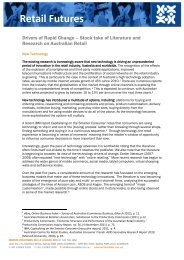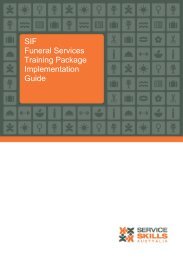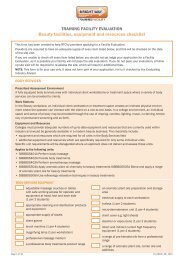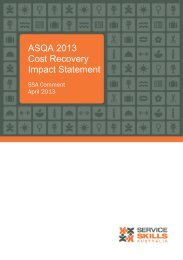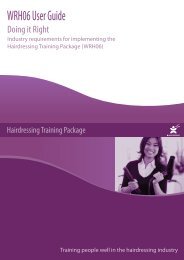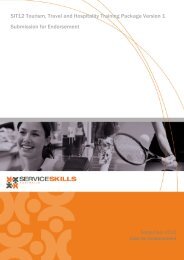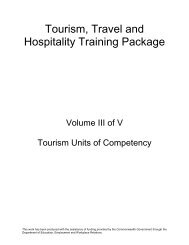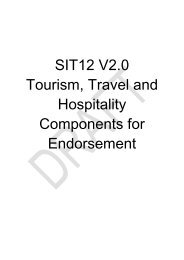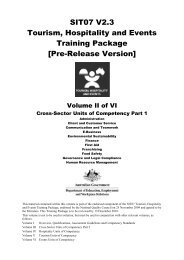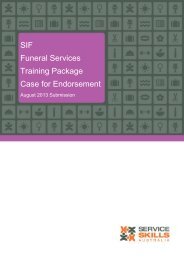Sustainability Skills Stocktake and Gap Analysis ... - Service Skills
Sustainability Skills Stocktake and Gap Analysis ... - Service Skills
Sustainability Skills Stocktake and Gap Analysis ... - Service Skills
Create successful ePaper yourself
Turn your PDF publications into a flip-book with our unique Google optimized e-Paper software.
<strong>Service</strong> <strong>Skills</strong> Australia<br />
<strong>Sustainability</strong> gaps in hospitality units <strong>and</strong> qualifications<br />
Hospitality includes coverage of environmental issues at both the unit <strong>and</strong> qualification<br />
levels, however this appears to be inconsistent through the training package <strong>and</strong> in some<br />
cases there are specific omissions which need attention.<br />
SITHACS004A Provide housekeeping services to guests <strong>and</strong> SITHACS005A Prepare<br />
rooms for guests do not reference waste disposal requirements, however would involve<br />
removal of rubbish.<br />
Some cooking units require skill in waste minimisation techniques <strong>and</strong> environmental<br />
considerations however this is not consistent across all cooking specialisations. Also,<br />
given the importance of waste for this industry, it is suggested that coverage of waste<br />
minimisation is not strong enough in both work activity <strong>and</strong> in planning services. In some<br />
cases the focus is on portion control, without reference to a wider waste management<br />
system; this is the case in the unit SITHCCC031A Operate a fast food outlet.<br />
Other gaps are considered to be in accountability for environmental sustainability. For<br />
example SITHCCC037B Manage facilities associated with commercial catering contracts,<br />
does not consider sustainability or environmental impacts within this important<br />
leadership function. Again, if waste, in water, food, power etc, is a key issue, leadership<br />
<strong>and</strong> management units must be stronger (<strong>and</strong> probably m<strong>and</strong>atory) in addressing the way<br />
this is managed in service delivery.<br />
An additional area in hospitality may be the engagement of customers in reducing the<br />
facility‟s carbon footprint including educational <strong>and</strong> promotional strategies.<br />
Events units <strong>and</strong> qualifications<br />
Events units <strong>and</strong> qualifications appear to include limited coverage of environmental<br />
sustainability issues. Examples include:<br />
SITXEVT006A Research <strong>and</strong> evaluate event industry trends <strong>and</strong> practices<br />
includes a Range Statement reference: Event industry information, ideas <strong>and</strong><br />
concepts may relate to: environmental sustainability.<br />
SITXEVT008A Plan <strong>and</strong> develop event proposals <strong>and</strong> bids requires knowledge in<br />
sustainability issues to be considered in formulation of event proposals <strong>and</strong> bids.<br />
In addition, Details <strong>and</strong> options for inclusion in the proposal or bid may include:<br />
information on approach to environmental impacts <strong>and</strong> issues.<br />
The implementation <strong>and</strong> development of sustainable workplace procedures are covered<br />
as elective units in cross sector units discussed at the end of this report section.<br />
<strong>Sustainability</strong> gaps in events units <strong>and</strong> qualifications<br />
Given the potential impact events may have on the environment, there appears to be<br />
weak coverage of risk analysis <strong>and</strong> planning processes aimed at identifying, analysing<br />
<strong>and</strong> planning for the minimisation <strong>and</strong> avoidance of environmental impact.<br />
30



